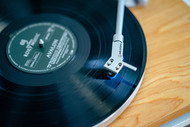How to Clean Vinyl Records: 3 Ways
Posted by House of Marley on Mar 29th 2023
Vinyl records are known and renowned for that subtle “hiss and crackle” sound. However, when records get too dusty, you’ll hear a blizzard of pops and clicks that take away from the music instead of adding to the ambience. That sound means it’s time for a deep clean.
Dust, dirt and fingerprints are the banes of vinyl’s existence. When the grooves get clogged with foreign particles, the record player needle can’t read the music accurately, resulting in poor sound quality or skipping records.
Does your record collection need some TLC? Cleaning records doesn't have to be a challenge. Follow our simple (yet practical) guide to learn the best ways to clean vinyl records—and keep them pristine!
How Do You Clean a Dirty Vinyl Record?
You can clean a dirty record with cleaning fluid (ideally one made for records), record washing machines or special vacuum cleaners. Sometimes using a combination of methods is the best way to fight stubborn dust and debris. We’ll show you how each technique works.
Cleaning Vinyl Records By Hand
Cleaning your dirty records by hand is the easiest way to keep your vinyl pristine. Done correctly, you can prolong the shelf life of your treasured collection.
Record cleaning kits are one of the essential vinyl record accessories. They include everything you need—a record-safe cleaning solution, a clean microfiber cloth and a carbon fiber brush. There are a ton to choose from, but we recommend the Vinyl Styl Ultimate Care Kit.
Follow these simple steps to clean your records by hand:
1. With the record spinning on the platter, rest the carbon fiber brush on the surface. After a few rotations, gently wipe away the record brush to remove dust and debris.
2. Take the record from the turntable platter. While holding your record by the edges, spray 2-3 pumps of record cleaning solution on the surface. Avoid spraying the center label.
3. Use the microfiber cloth to clean the record’s surface. Wipe the cloth in a circular motion, following the groove.
4. Allow the surface of the record to dry, then repeat the process on the other side.
Voila! A clean record.
Record Washing Machines
Record washing machines clean both sides of a record simultaneously. Vinyl lovers use these all-in-one units to safely remove dust, smudges and fingerprints in seconds.
When you’re shopping around the web, you’ll come across automatic and manual record cleaning machines.
Automatic record washers are motor-driven. The Humminguru, for example, uses low-frequency sound waves to remove contaminants from your record—no chemicals or cleaning fluid required. Additionally, you can choose between different cleaning modes, depending on how dirty your records are.
Manual record cleaning machines are hand-operated and require cleaning fluid. Though they’re not as ‘fancy’ as automatic washers, they work just as well. The Spin-Clean MK2 is the most popular option.
Watch the video below to see why other record collectors love it.
Vinyl Vacuum Cleaners
You can also clean your records with a vinyl vacuum cleaner—not to be confused with your average Roomba.
Using a high-powered “vinyl vac” removes impurities in seconds. As the record rotates on the machine, an internal vacuum sucks dirt and debris from the record surface. You’ll see and hear a noticeable difference.
Vinyl vacuum cleaners vary in price. While automatic vacuum cleaners are pretty expensive, you can grab a manual one like the Record Doctor V for $220. The Record Doctor V is budget-friendly, making it a great option for beginners who want to expand their hi-fi repertoire.
Check out this video to see an example of how it works.
The Next Step: Storing Your Records
Cleaning your records is only half the battle. After cleaning, you have to store your records properly to keep them pristine for years to come.
For starters, though every album comes with inner sleeves, sometimes they need to be replaced. This is especially true for vintage records from the 50s, 60s and 70s. We recommend using anti-static sleeves that won’t collect dust or scratch your records, like the MoFi Master Sleeves.
Additionally, your records should be stored in a safe environment. Humid attic spaces, for example, aren’t ideal. Instead, store your records upright—never leaning—on a clean shelf or in a crate.
Frequently Asked Questions
There are several other DIY ways to clean your records, but not all methods are safe or effective. Here are some frequently asked questions we’ve heard about cleaning vinyl.
Can I use water to clean vinyl records?
You should only use distilled water to clean vinyl records. Tap water has minerals and lime deposits that can build up in record grooves. Always ensure the record is dry before storing or playing it.
Is it OK to clean vinyl records with alcohol?
You should avoid cleaning vinyl records with alcohol. Although it’s an effective cleaning agent, the alcohol will destroy the protective coating of the vinyl over time.
Isopropyl alcohol, however, is a popular ingredient in many DIY record-cleaning fluids. Mixing 1/4 of isopropyl alcohol, 3/4 of distilled water and a few drops of Rinse Aid is a safer solution with few drawbacks.
Enjoy a Cleaner Sound
In short, cleaning records may seem scary at first, but it doesn’t have to be! Now that you have a few ways to clean vinyl records, you can make your collection last longer and enjoy a clear sound. When you’re ready to upgrade your setup, check out House of Marley Stir It Up Turntables and premium Bluetooth speakers.













